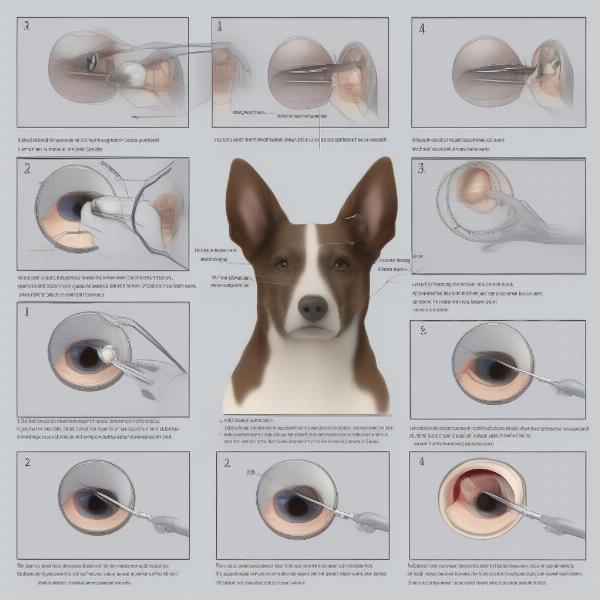Anterior lens luxation (ALL) is a serious eye condition in dogs where the lens, the transparent structure behind the iris, dislocates and moves forward into the front part of the eye. This can cause significant pain, glaucoma, and even blindness if left untreated. Understanding the causes, symptoms, diagnosis, and treatment options for anterior lens luxation is crucial for any dog owner.
What Causes Anterior Lens Luxation in Dogs?
Anterior lens luxation can occur due to a variety of reasons, the most common being genetic predisposition. Certain breeds, such as the Terrier breeds, Miniature Poodles, and Chinese Cresteds are particularly prone to this condition. Trauma to the eye can also cause the lens to dislocate. In some cases, ALL is secondary to other eye conditions like uveitis or glaucoma.
Recognizing the Symptoms of ALL in Your Dog
Recognizing the signs of anterior lens luxation early is vital for effective treatment. Symptoms can vary in severity and may include:
- Redness and pain in the affected eye: Your dog may squint, paw at their eye, or show signs of discomfort.
- Cloudiness or discoloration of the eye: The eye may appear hazy or bluish.
- Dilated pupils: The pupil may be larger than normal.
- Visible displacement of the lens: In some cases, you may be able to see the lens out of place.
- Sudden blindness: If the luxated lens completely blocks the pupil, it can cause sudden loss of vision.
Diagnosing Anterior Lens Luxation
If you suspect your dog has anterior lens luxation, it’s crucial to take them to a veterinarian immediately. The vet will perform a thorough eye examination, including checking the intraocular pressure, to confirm the diagnosis. They may also use specialized instruments to visualize the lens and assess the extent of the dislocation.
Treatment Options for Anterior Lens Luxation in Dogs
Treatment options for anterior lens luxation depend on the severity of the condition and the presence of secondary complications like glaucoma. Medical management may involve eye drops to reduce pain and inflammation and manage glaucoma. In many cases, however, surgery is the recommended course of action to remove the dislocated lens. This procedure can significantly improve the dog’s comfort and vision.
 Surgical Removal of Luxated Lens in a Dog
Surgical Removal of Luxated Lens in a Dog
Long-Term Management and Prognosis
After treatment, your dog will require regular check-ups to monitor their eye health and ensure there are no complications. While the prognosis for vision restoration varies, prompt diagnosis and treatment can significantly improve the outcome. Even after successful surgery, some dogs may experience some degree of vision impairment.
What to Do if You Suspect ALL
- Seek immediate veterinary attention: Early intervention is crucial for managing anterior lens luxation effectively.
- Avoid rubbing or pressing on the eye: This can worsen the condition and cause further damage.
- Follow your veterinarian’s instructions carefully: Adhere to the prescribed medication and follow-up appointments diligently.
FAQ
- Is anterior lens luxation painful for dogs? Yes, it can be very painful.
- Can anterior lens luxation be cured? While the dislocated lens can be surgically removed, some vision impairment may remain.
- Is anterior lens luxation hereditary? Yes, there’s a strong genetic component, particularly in certain breeds.
- What is the recovery time after surgery for anterior lens luxation? Recovery typically takes several weeks, with regular follow-up visits to the veterinarian.
- Can anterior lens luxation occur in both eyes? Yes, while it can affect one eye initially, it can eventually develop in the other eye as well.
- How much does surgery for anterior lens luxation cost? The cost varies depending on the veterinarian and the complexity of the case.
- What are the long-term complications of anterior lens luxation? Potential complications include glaucoma, retinal detachment, and blindness.
Conclusion
Anterior lens luxation is a serious eye condition that requires prompt diagnosis and treatment. By understanding the causes, symptoms, and treatment options, you can help protect your dog’s vision and overall well-being. If you notice any changes in your dog’s eyes, don’t hesitate to consult a veterinarian.
ILM Dog is your trusted resource for all things dog-related. We provide expert advice on dog breeds, health, training, nutrition, grooming, and much more. Our mission is to empower dog owners worldwide with the knowledge and resources they need to provide the best possible care for their furry companions. For professional guidance on dog health and wellness, contact us via email at [email protected] or phone at +44 20-3965-8624. Visit ILM Dog for more valuable information and resources.